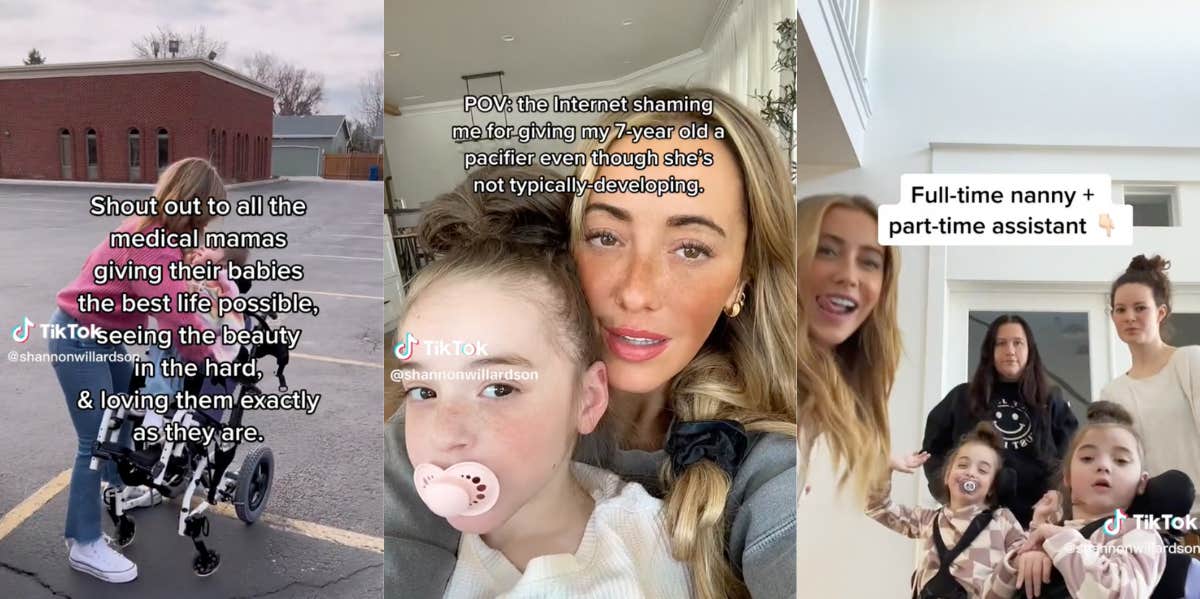Mom Says People Shame Her For Giving Her 7-Year-Old Daughter A Pacifier For Comfort
She asks people not to judge her for the choices that work best for her family.
 TikTok
TikTok Shannon Willardson of Boise, Idaho, is the mom of three children, two of whom have special needs.
Willardson’s TikTok account captures her day-to-day family life, including the lives of her daughters Ava and Charlie, who both have a rare genetic disease.
The mom stood up for herself when she was shamed for letting her daughters with special needs use pacifiers for comfort.
Willardson posted a POV TikTok defending her daughter’s use of a pacifier, commenting on, “the internet shaming me for giving my 7-year-old a pacifier even though she’s not typically-developing.” She captioned the post by stating that “different ‘rules’ apply for different-needs kiddos.”
“Developmentally my daughters are under the age of 1, so it’s not inappropriate for them to have a pacifier—especially because they significantly help to comfort them.”
To further shut down those harsh internet critics, Willardson noted that her daughters’ doctors, physical therapists, and occupational therapists all agree that it’s okay for them to use pacifiers for comfort.
This particular video, and her page in general, serves Williardson's wider mission of bringing visibility to parents raising kids with special needs. Online, mom-shaming is rife and Williardson's page serves as a reminder that you never know someone's unique situation or the reasons why they make the choices they do for their kids.
In another popular post on her page, she captured footage of herself placing one of her daughters in a wheelchair, stating, “Shoutout to all the medical mamas giving their babies the best life possible, seeing the beauty in the hard, and loving them exactly as they are.”
Her daughters have CDG, or Congenital Disorders of Glycosylation. CDG is defined as “an umbrella term for a rapidly expanding group of over 130 rare genetic, metabolic disorders due to defects in a complex chemical process known as glycosylation.”
The National Institute of Health states that “individuals with a CDG are missing one of the enzymes that is required for glycosylation. The type of CDG that a person has depends on which enzyme is missing.”
The NIH reports that fewer than 50,000 people in the United States have CDG and that symptoms of CDG start to appear in someone affected by the disease as a newborn and in infancy.
Children's Hospital of Philadelphia notes that CDG affects “the way sugar building blocks are attached to proteins within and on the surfaces of cells” which in turn affects how cells in the body function. CDG varies in its levels of severity, “from mild to severe, disabling or life-threatening.”
Willardson's daughters are thriving with the devoted care she provides for them. She acknowledges that the level of care her daughters need is intense, but she loves them as they are, and offers them full lives.
Her videos also highlight the importance of outside support. In another video, she recorded her daughterts alongside their full-time nanny and part-time assistant, commenting on the post that she has “the most involved [and[ supportive husband in the world,” and that she lives near “lots of family” members who help out.
“It takes a village,” Willardson exclaims, and anyone with caregiving experience knows how true this statement is.
However Willardson decides to parent her children is her choice, and no amount of internet hate can change the fact that she knows what's best for her family.
Alexandra Blogier is a writer on YourTango's news and entertainment team. She covers celebrity gossip, pop culture analysis and all things to do with the entertainment industry.
